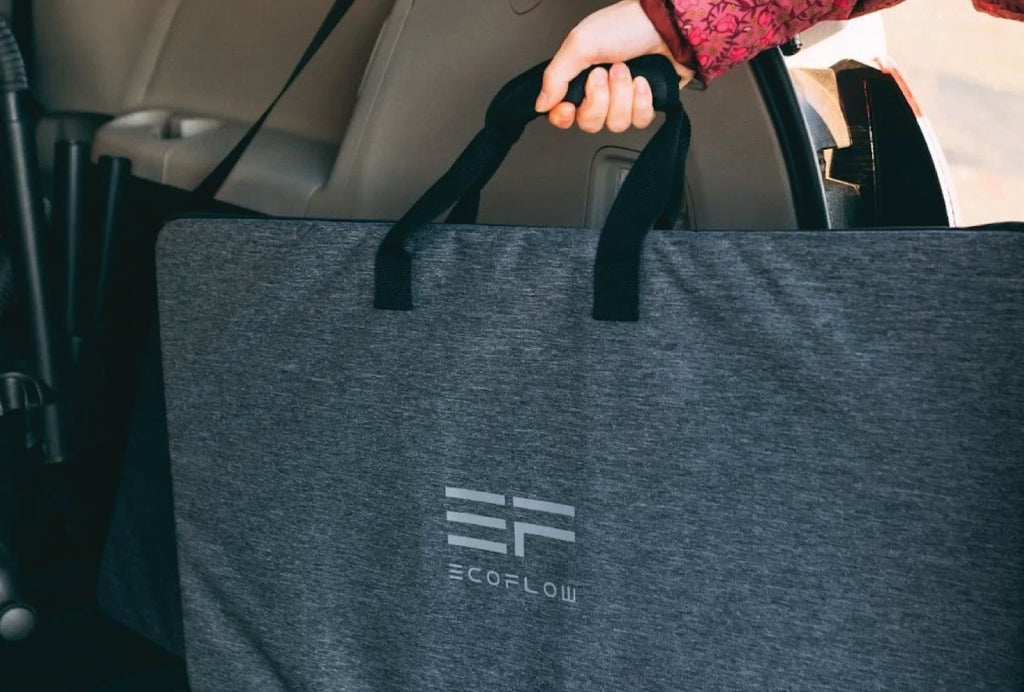Portable solar panels are one of the cleanest, most cost-effective ways to keep your devices powered. Paired with solar generators, they can store energy for later use. Ideal for camping, road-trips, van life, or even during a blackout.
What should you consider before buying a portable solar panel?
Solar panels come in a bunch of shapes and sizes, so there are a few questions you should ask yourself before you buy. In this blog post, we’ll tackle five things to help you make a choice:

160W Solar Panel + EcoFlow DELTA
Which solar power generator do you own? Why is that important?
When pairing your foldable solar panel with your solar generator, you’ll want to consider the capacity of the battery. A larger battery will be suited to a larger solar panel, or even multiple solar panels chained together. However, if your power station has a smaller capacity, you can get away with a much smaller panel as you have less capacity to charge.
Solar Panels For Large Portable Power Stations
Let's take EcoFlow DELTA Pro as an example of a large power station. It has a 3600Wh capacity, expandable all the way to 25kWh. In this case, a small solar panel will take a long time to charge your unit to full. Here you should use larger panels such as EcoFlow’s 400W panels (coming 2021), or you can chain multiple smaller 160W panels together. With multiple solar panels, you’ll be able to charge larger EcoFlow power stations in mere hours.
Solar Panels For Smaller Portable Power Stations
If you’ve got a power station that puts portability first, such as EcoFlow RIVER Pro (720Wh) or DELTA (1260Wh), you might want to opt for smaller panels to stay travel friendly. A good pick here might be a 110W EcoFlow Solar Panel or the 160W option. Again, you can chain panels together here to charge up in 4—8 hours.

Is your power station compatible with portable solar panels?
You should double-check that your power station supports a high solar input, has an MC4 port and supports a wide voltage range. Some power stations lack sufficient solar input and voltage ranges. EcoFlow portable power stations all have high solar input for their sizes, ranging from 200W for the RIVER series, to a massive 1600W for EcoFlow DELTA Pro.

What kind of solar panel do you need?
For different uses, you’ll want different kinds of portable solar panels. Let’s take three use cases:
Solar panels for home backup
If you're solely looking for home backup, you’ll likely have a larger solar power generator, such as a DELTA Pro or DELTA Max. In this case the same advice applies, a larger portable solar panel, or multiple panels would be best for faster charging. DELTA Pro also supports rooftop solar when the grid is online, a nice touch when integrated with your home via the Smart Home Panel.

Solar panels for camping & outdoors
With camping on the rise, the need for outdoor power is on the rise too. If you’re heading camping, portability is usually an important factor. Your panel should also be dust + water-resistant. Here, EcoFlow’s 110 or 160W panels would be good picks as they’re compact & efficient too.

Is portability more important, or charge speed?
With the above in mind, you’ll start to get an idea of what kind of solar panel you need. If portability is more important to you, you might opt for a smaller panel such as EcoFlow’s 110W panel. The larger EcoFlow 160W solar panel is a good middle ground, with the 400W option a good choice if you need to maximize charge speed for larger power stations.
Whichever panel you go for, they’re all foldable, come with a kickstand carry bag, and are dust and water resistant.

In short, what should I buy?
TLDR? Here’s a summary. When shopping for a solar panel, you should consider the solar panel's wattage (the higher, the faster your power station will typically charge), portability, and also dust & water resistance. You should also double-check your solar generator’s limitations for solar input, voltage and ensure it has MC4 ports.
You can weigh up what is most important to you to pick the right panels & compare options here.

